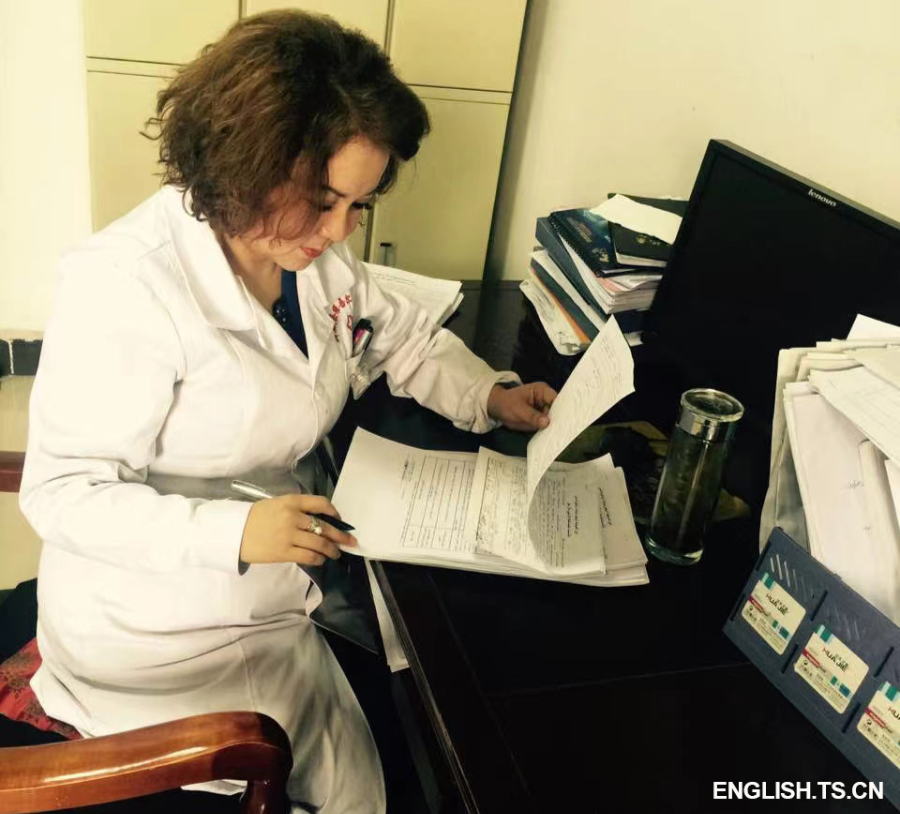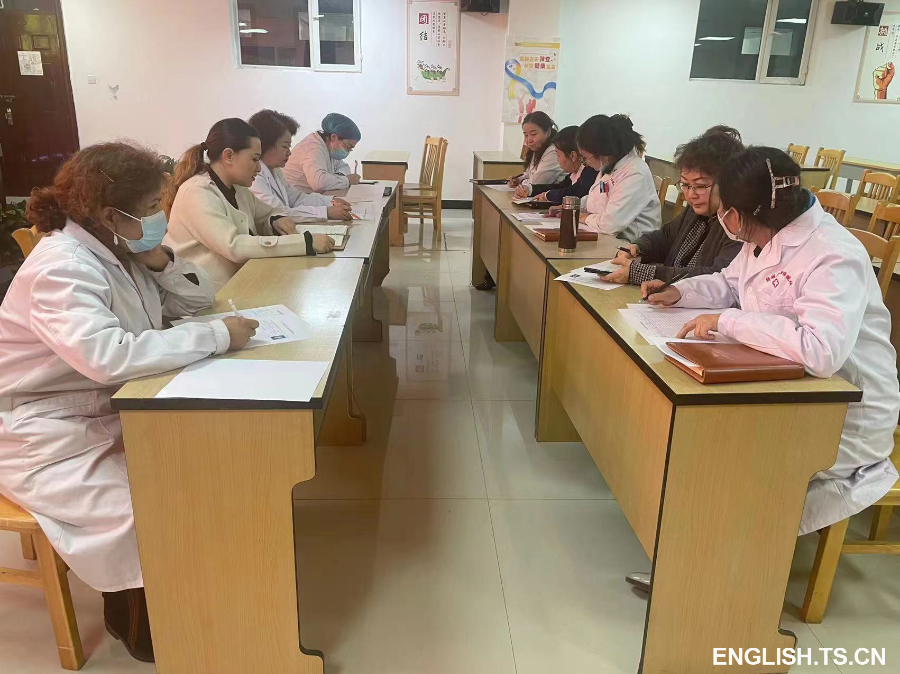Tianshannet-Xinjiang Daily (Reporter Zhang Zhili, Correspondent Deng Lijuan) news: “As a doctor in a maternal and child health center, protecting the health of women and children is safeguarding the happiness and hope of their family. It is of great significance to do this and to do it well,” said Rebiyemu Tuniyazi, the Party branch secretary and chief physician of the Obstetrics and Gynecology Department of Baicheng County Maternal and Child Health Hospital in an interview on December 2.

Rebiyemu Tuniyazi (R) performs surgery with local doctors while studying in Wenzhou, Zhejiang Province. (Photo provided by Rebiyemu Tuniyazi)
Being a good doctor is my lifelong pursuit
“Having seen so many people suffer from illness, I want to do something for them,” said Rebiyemu. When asked about her career choice, the seasoned doctor with 27 years of invaluable experience shared her story.
Rebiyemu was born in 1974 in Heiyingshan Township, Baicheng County, and her parents were both farmers. At that time, due to the poor medical conditions, economic conditions and health awareness, many women gave birth at home, which might be a cause for their gynecological diseases later.
“Two encounters stroke me particularly hard. When I was a child, I went to visit my aunt, Tunishahan Tuerdi. She was lying on the bed, and her face looked pale. We were told that she had cervical cancer, which was already in the advanced stage. Later when I graduated from Xinjiang Uygur Medical College and worked as an intern doctor in the obstetrics and gynecology department of a hospital in Hotan, I saw another cervical cancer patient; she was young but dying. That’s why I studied medicine and decided to become an obstetrician-gynaecologist,” said Rebiyemu.
Because of her outstanding performance during the internship, Rebiyemu was offered a job to become a teacher in the college, but she politely declined. “The year of internship in the obstetrics and gynecology department has made me more determined to become a doctor. The cervical cancer can be detected and treated through early screening. I want to learn more about it, return to Baicheng County, and use my knowledge and skills to help my people,” said she.
Rebiyemu believes that where you start does not determine how far you can go, but how hard you work will. To better treat and serve the patients, she obtained a master’s degree from Xinjiang Medical University, did on-the-job training at hospitals in Urumqi, Aksu, and Wenzhou in Zhejiang Province, and brought advanced diagnosis and treatment techniques with her back to Baicheng.

Rebiyemu Tuniyazi conducts daily rounds and carefully analyzes the situation of hospitalized patients. (Photo provided by Rebiyemu Tuniyazi)
Baicheng has built a primary-level health service network covering both urban and rural areas. People can have their minor illnesses treated in their village and major illnesses attended to in the county. The public health services provided by the state to urban and rural residents free of charge cover every stage of life of the residents. As the conditions of primary-level health institutions continue to improve, Rebiyemu has more confidence in researching maternal and child health care, and becomes better at leading her team to serve the patients.
Deliver high-quality medical services to the people
Rebiyemu always keeps herself busy. Her main job is to provide medical consultation and make ward rounds. On weekends, she would take her team to towns and villages, and proactively pay follow-up visits to high-risk pregnant women and high-risk children.
Her research focuses on how to treat incurable gynecological diseases through traditional Uygur medicine. She constantly explores new technologies of using traditional Uygur medicine to help with the clinical diagnosis and treatment of gynecological diseases. She has introduced therapies such as the Zimadi therapy (one of the traditional treatment techniques of Uygur medicine), the packed medicinal herb therapy, and the fumigation therapy. She and her team also actively develop a department of Uygur medicine for treating certain diseases.
When asked about the diagnosis and treatment quality of Baicheng County Maternal and Child Health Center, Ayituerxun Aximu, a patient who has recovered and been discharged from the hospital, gave a thumbs up. When she was diagnosed with chronic cervicitis, she did not want to have surgery, so Rebiyemu patiently formulated a treatment plan for her: Rebiyemu ground a variety of medicinal herbs into powder, applied the powder to her lower abdomen, and then used such techniques as diathermy, ozone, and infrared treatment. Her condition improved after a few courses of such treatment.
Thanks to the dedication of Rebiyemu and her colleagues, since the beginning of this year, Baicheng County Maternal and Child Health Center has actively organized assistance for high-risk pregnant women and high-risk children. It has helped five high-risk pregnant women and three high-risk children, and the assistance fund reached RMB 65,000.
“My son was born prematurely. In September this year, he was sent to the neonatal department of the County People’s Hospital for hospitalization due to pulmonary hypertension and purulent meningitis, among other diseases. The medical bill amounted to nearly RMB 90,000. In addition to the reimbursement, the county’s maternal and child health center donated RMB 10,000 to us, so the out-of-pocket amount for us was less than RMB 20,000,” said Reziyamu Maihemuti, a resident of the town of Sailimu.
Share clinical experience with more peers
“To build a healthy countryside, we shall focus on not only the development of primary-level healthcare, public health, health preservation and medical insurance, but also the collaboration between health institutions and nursing homes, talent cultivation, intra-regional sharing of resources, and smart healthcare, so as to promote the upgrading of the health industry and better serve the farmers,” said Rebiyemu.
This year, Rebiyemu has given 14 lectures to young doctors, organized gynecologists in township health centers to receive training on the diagnosis and treatment techniques of Uygur medicine, and mobilized township health centers to actively open TCM therapy rooms, and organize diagnosis and treatment knowledge competitions, so as to stimulate the enthusiasm for learning and improve the professional skills of medical workers.
Xue Yan, an attending doctor in the Department of Gynecology at Baicheng County Maternal and Child Health Center, said, “Ms. Rebiyemu taught us everything she knew about Uygur medicine and its diagnosis and treatment methods, and took us on ward rounds. Based on the patient’s conditions, she would tell us how to rectify the medical instructions, helped us improve the treatment proposal, and taught us young doctors new projects and technologies. We learned very fast from her.”

Rebiyemu Tuniyazi (third from left) organizes a medical staff meeting to analyze medical records. (Photo provided by Rebiyemu Tuniyazi)
Sailiman Yibulayin also studied under Rebiyemu and is now the director of the Department of Obstetrics and Gynecology at Baicheng County Hospital of Traditional Chinese Medicine. “Ms. Rebiyemu often asked us to make good use of the medical skills we had learned, and continue to study the latest technologies to bring better medical services to women and children in the county.”
“I consider it my lifetime mission to do good for women and children. I hope to pass on my clinical experience to more peers through multi-level academic exchanges and diagnosis and treatment exchanges,” said Rebiyemu.









